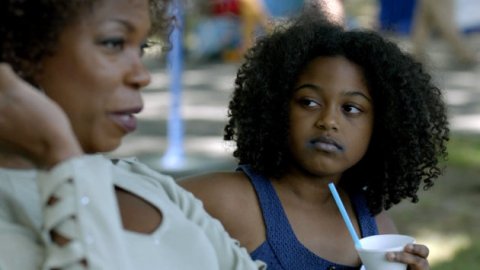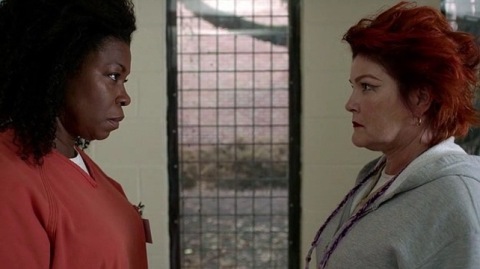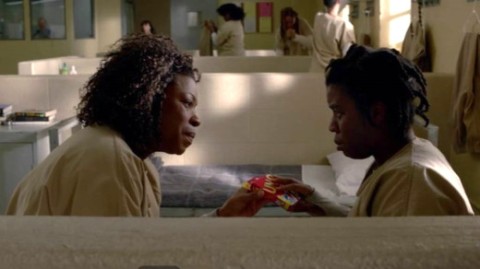This is Lorraine Toussaint as Yvonne “Vee” Parker. We might call her a new character in Orange is the New Black‘s second season, but she’s well-known to two of Litchfield’s current inmates… for complicated reasons. She is the best female antagonist I’ve ever seen, and one of the best antagonists ever.
To Taystee (Danielle Williams), Vee is the foster mother who finally gave her a home. Sure, that home was the locus of a powerful drug corporation. But Vee knew how to inspire loyalty and a sense of family — and we can see her use exactly the right strings to pull Taystee back, to transform her into the loyal soldier she used to be before prison.
In flashbacks we learn exactly how Vee has earned such loyalty from Taystee: by providing exactly that feeling of belonging and family — as well as just the right dose of race pride — that her life lacked beforehand. Moreover, Vee is the best possible “mother”: smart, powerful, admirable. The fact that she runs a drug empire is incidental to her maternal effects on the lonely Taystee.
Once Taystee is on board, Vee pursues the loyalty of a small group of other young Black women to build her prison “family” — using a variety of the same techniques carefully calibrated to each woman (maternal gentleness, tough love, gestures to racial unity and vague promises of uplift and power). But not Taystee’s gay best friend Poussey (Samira Wiley, whom the New Yorker‘s Emily Nussbaum aptly describes as “radiant”). Vee persuades Taystee to join in the exclusion and demonization of Poussey, a mean-girl process so real and devastating that I almost couldn’t watch those scenes.
Red (Kate Mulgrew) also has a history with Vee, but in her case it goes back to earlier prison days as competitors for control of the prison’s black market. Witnessing Red’s anxiety about talking to the leonine Vee for the first time gives us an insight into her character that we hadn’t seen before: for the first time in years, she worries that her aging will lead Vee to sniff out her weakness. In anticipation, she visits Sophia’s salon to amp up her fierceness.
And yet when they meet, they embrace warmly, like old friends.
Indeed, it is Vee’s capacity to convey warmth and insight that makes her so powerful, and so capable of deception. Witness her effect on the perpetual outsider, Suzanne “Crazy Eyes” (Uzo Aduba). She insists on calling her Suzanne. With a few correcting glances from Vee, Suzanne stops undermining herself and her mental stability, and speaks with new confidence. Under to heat of that seeming maternal affection and guidance, Suzanne glows like a light bulb and happily serves as Vee’s henchman, the muscles to Vee’s brains.
With everything else going on for me this summer, it took me forever to finish Season 2 — but throughout I marveled at the manipulative twists and maneuvers of Vee, who is the best antagonist I’ve seen in FOREVER. And it’s partly such a great character because she’s a woman who has learned to use people’s assumptions about her to her advantage. Think about it: we love a good bad guy — Alan Rickman in Die Hard, Heath Ledger as the Joker in The Dark Knight, Kevin Spacey as the horrifically Bible-obsessed baddie in Se7en — but when was the last time you saw a female antagonist worth remembering, for all the reasons why women learn how to extract power and manipulate others using their femininity?
But don’t get me wrong: this is not just a portrayal of a great female antagonist. This is the best antagonist in years, full stop.
Feast your eyes, friends.
“Orange is the New Black” (2013) was created in a test tube for me
25 September 2013
So I’m already deep into the semester with a new lecture class, which means I spend most of my time prepping, grading, and hyperventilating. This makes it all the more important that I can watch an episode of Orange is the New Black on Netflix every couple of days to decompress. Because if there’s ever a show that overturned every hoary teevee trope, it’s the way this one has told a new story about women’s prison.
This show is amazing, and I’m pretty sure it was created because someone read my blog and said, “Let’s throw this bitch a bone: a show about women’s prison with a whole bunch of unknown actors of various races, sizes, and sexual orientations. This blogger will lose her shit.”
Which is pretty much what has happened. I only wish I had time to sit down and watch it all in a single popcorn and martini-fueled binge weekend. From the opening credits all the way through every single 60-minute rich episode, I’m in heaven.
If this seems at first like yet another story of a blonde girl who finds herself in strange and comical circumstances, you haven’t watched what’s really happening here. Sure, our protagonist is a WASPy blonde upper-middle class woman named Piper (Taylor Schilling) who enters the prison because a while back she transported drug money for a girlfriend — and the show gets a lot of its early raison d’être from Piper’s wide-eyed introduction to prison realities. Whoa, a Black woman they call Crazy Eyes (Uzo Aduba) forms a crush on Piper! What will she do? Whoa, everyone in prison huddles in groups by race! Will Piper hang out with only white women?

But it doesn’t take long before you realize that this is only partly a show about Piper, especially as successive episodes dedicate themselves to complex backstories for each of the key inmates. In fact, we should have anticipated this from the beginning, for the opening credits — featuring a montage of the faces of real and former female inmates — gives us intimate images of the eyes and freckles and piercings and wrinkles of real, non-WASPy faces.
While Piper tries to maintain a relationship with her risk-averse fiancé Larry (Jason Biggs) — who goes on living a spectacularly comfortable New York life — her fellow inmates’ lives and intrigues become far more compelling. There’s the post-op trans Sophia (Laverne Cox), the prison’s hair stylist, whose estrogen pills are curtailed during budget cuts, and who forms a prickly, unlikely relationship with the incarcerated nun with the hope that she can persuade the nun to hand over her post-menopausal hormones. Cox plays this role with an extraordinary delicacy, particularly in scenes with Sophia’s family back home — the wife and son who remain supportive, despite the fact that she failed them when she used stolen credit cards to pay for the sex reassignment surgery.
 Even the vindictive, whisper-tiny Bible-thumping redneck and former meth addict, Tiffany (Tamryn Manning), who gets played as more of a heavy than most of the characters, proves to have a method to her madness.
Even the vindictive, whisper-tiny Bible-thumping redneck and former meth addict, Tiffany (Tamryn Manning), who gets played as more of a heavy than most of the characters, proves to have a method to her madness.
Question: will Tamryn Manning ever get another role after this besides as Bible-thumping crazies with rotted teeth and strong Southern accents?
Among my Facebook friends there has been nothing but expressions of fast-burning love for Alex (Laura Prepon, formerly of the unwatchable That 70s Show and one of the very few recognizable faces here). Alex isn’t just tall, dark, and blessed with those eyebrows. Nor is she merely a woman who knows how to throw her shoulders back, how to level a heavy-lidded direct gaze at a gal, and how to choose a great pair of specs.
She’s also Piper’s former lover — the one who ran the drug cartel operations, the one who asked Piper to carry the money, and maybe the one who gave Piper’s name to the Feds … felicitously tossed into the same prison. She’s that one — The One? — with whom Piper carried on a long, passionate relationship charged in part by the riskiness of their work and the glamour of all that money. One look at Alex and I dare you not to start fantasizing. We know immediately that poor Larry, the hapless fiancé, has got himself a problem.
 Yes, Alex is one of those perfect fantasy objects, for whom no stint in prison is going to alter her impeccable eyebrow maintenance or lipstick choices. Yes, perhaps not all of us would run into such a vision while in prison. Yes, this feels a lot like one of those “let’s tempt our viewers to want Piper to go gay again!” kinds of teevee moments.
Yes, Alex is one of those perfect fantasy objects, for whom no stint in prison is going to alter her impeccable eyebrow maintenance or lipstick choices. Yes, perhaps not all of us would run into such a vision while in prison. Yes, this feels a lot like one of those “let’s tempt our viewers to want Piper to go gay again!” kinds of teevee moments.
But although her character is used to forward the plot in particular ways (and to send my Facebook friends into orgasms of thrill), Alex is not the story here. Nor is Piper the story. The real story is the new narratives of possibility opened up by focusing on women.
This goes so far beyond the famous Bechdel Test — that incredibly low standard for gauging how much a film gives a single thought to women — that you wonder whether you can ever go back to stomaching the rest. Let me just focus on one tiny thing here: women of different races in conversation with each other, in proximity to one another, fighting with/ hating/ distrusting/ accommodating/ getting to know one another.
Think about it. Can you think of any show, ever, in which this happened?
So yes, creators of Orange is the New Black: my mind is officially blown. And best of all, Piper gradually becomes something very different than that wide-eyed woman who was immediately the favorite of the seemingly soft-hearted counsellor Healy. I can hardly wait for Season 2.














